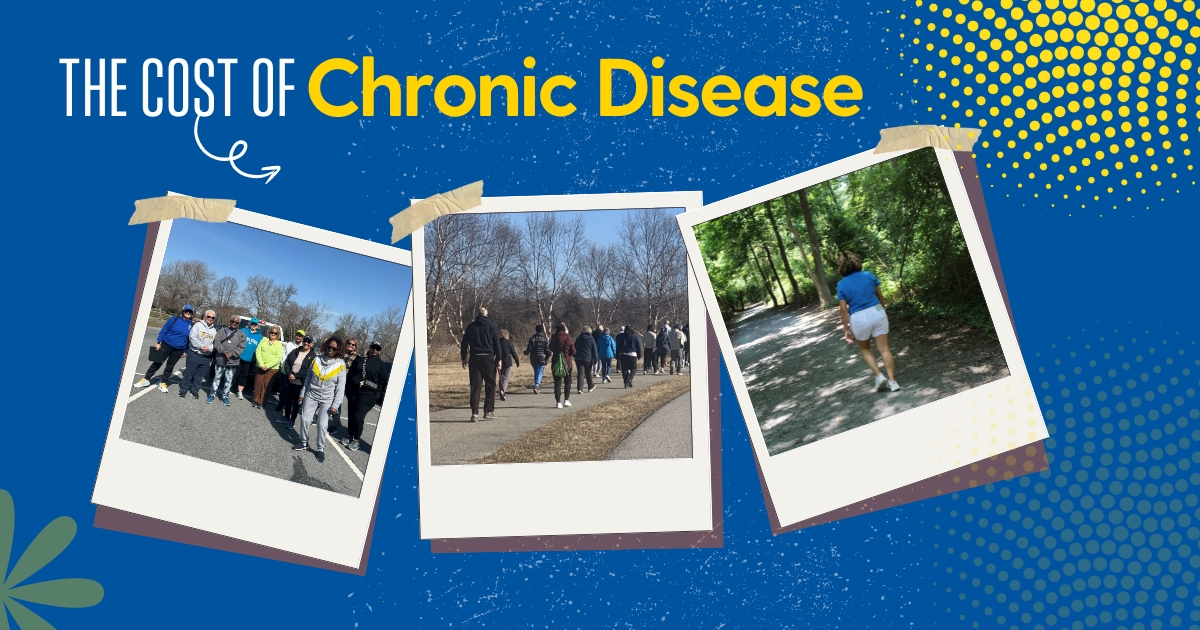
Category: Cooperative Extension

The Cost of Chronic Disease
May 23, 2025 Written by Nancy Mears, Sussex County Extension Agent – Health & Well-being
Chronic diseases dominate US healthcare costs, especially in Delaware, where the aging population and high obesity rates exacerbate the issue. Delaware’s 65+ population is projected to grow by 65% from 2015 to 2050. From 2016-2023, chronic diseases cost the State of Delaware $135 billion. Nationally 1 in 5 people live in a rural community, where there are more significant health disparities as compared to those living in urban areas. Poor health places a strain on the nation’s resources. Higher healthcare costs, lost workforce productivity and increased attrition rates in the miliary are all effects of poor health. According to the Behavioral Risk Factor Surveillance Survey (BRFSS), over 71% of Delaware adults are obese and overweight. In addition, Delaware adults reported several chronic disease risk factors including high cholesterol, diabetes, arthritis, and depression. Less than a quarter of Delaware adults report participation in enough aerobic and muscle strengthening exercise to meet the current Physical Activity Guidelines for Americans.
Investing in community health
Health promotion and disease prevention initiatives aren’t free, but they are less expensive than chronic disease treatments. UD Cooperative Extension, a department in the UD College of Agriculture & Natural Resources, helps fulfill the University’s land grant mission. By participating in a nationwide network of colleges and universities providing evidence-based programs to improve health and well-being, UD Cooperative is making healthy behavior changes possible to Delawareans.
A main funder of the UD Cooperative Extension’s adult physical activity initiative is the United States Department of Agriculture’s Supplemental Nutrition Assistance Program –
Education (SNAP-Ed). The Healthy Hunger Free Kid’s Act of 2010 expanded the scope of SNAP-Ed beyond nutrition to include physical activity and obesity prevention efforts, forming a comprehensive public health approach to health promotion and disease prevention.

Locally, staff members at UD Cooperative Extension work in collaboration with volunteers, healthcare systems, local health coalitions, local, state and federal agencies as well as other UD colleges to engage funders and community partners to address chronic disease. In kind donations from parks and recreation departments, as well as Delaware libraries, provide advertising, parking and space to conduct programming. In addition, mini grants from the Delaware Division of Public Health’s Physical Activity, Nutrition, and Obesity Prevention (PANO) Advancing Healthy Lifestyles initiative and the Sussex County Health Coalition’s Let’s Get Healthy Sussex initiative have been instrumental in patching the financial gaps to make physical activity opportunities affordable and accessible statewide.
UD Cooperative Extension expands outreach by working closely with volunteers and UD students. Master Wellness Volunteers (MWVs) are dedicated community members who have successfully completed training to lead community health programs. Many MWVs volunteer to lead walk clubs as part of their commitment to personal health goals, while also contributing to the well-being of their local communities. Valerie Simmet, a Master of Health Promotion and Health Coaching graduate student in the University of Delaware’s College of Health Sciences, is interning with UD Cooperative Extension this Spring. “My internship with the UD Cooperative Extension's Walk With Ease program has been one of the most rewarding parts of my graduate experience and has played a key role in shaping my path toward a career in community health. What has stood out the most is seeing firsthand how much of a difference this work can make in people's lives. Through coaching sessions, program support, and attending the weekly walking groups, I've been able to witness participants make meaningful progress toward their health goals, often sharing how supported and motivated they feel along the way. It's been incredibly fulfilling to know I'm helping make behavior change more achievable and realistic across the community, and this experience has reinforced that community health efforts are most impactful when they start by understanding and supporting the individuals they aim to serve. That's where the real change begins.”
Creating personal health accountability
Being physically active is vital at every stage of life, whether you are promoting health or managing disease. Creating and maintaining an active lifestyle provides a multitude of health benefits, many of which become noticeable shortly after beginning a routine. For adults, at least 150 minutes of moderate to vigorous or activity where you are working hard enough to be “breathless” is recommended, to include 2-3 days of muscle strengthening activities. Some examples of activities could include walking, running, strength training, swimming, gardening, yoga, pickleball or participating in another sport or activity that you enjoy. For adults 60 years old and over, activities that focus on balance should also be incorporated.
Physical activities are linked to improved mental health, stress resilience and overall well-being. Ginger Speight, a Seaford resident, participates in the UD Cooperative Extension’s Walk With Ease program. “Before joining the University of Delaware Walk With Ease Program, I was leading a very sedentary lifestyle. Rarely did I do any exercise except for going to the store. Since joining the program, it has inspired me to be more active and moving around my house, I do YouTube exercises and in addition to the walking club. I do line dancing and I’ve joined a Tai Chi class. I’m more conscious that I must have an active lifestyle to maintain good health. I keep a log of the steps and activities that I do daily.”
Transitioning to an active lifestyle doesn’t have to be complicated or expensive. Here are some ideas you can use to start moving more today:
Take a few laps around the store or parking lot before starting your shopping.
If you have an hour-long lunch break, use 30 minutes to walk or participate in a free online fitness class. · Need extra accountability that is fun and free? Join a UD Cooperative Extension walk club!
For more information, please visit http://www.udel.edu/0012050 or contact Nancy Mears, at mears@udel.edu or 302-831-3284. Always consult your healthcare team before starting a physical activity program.
